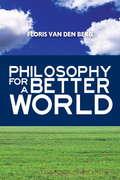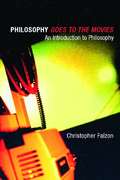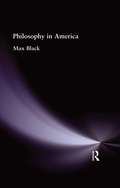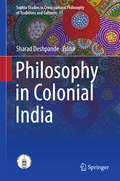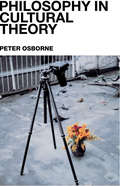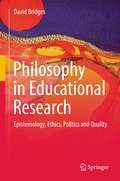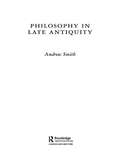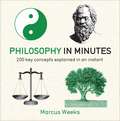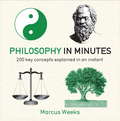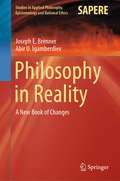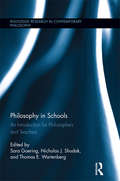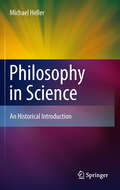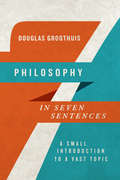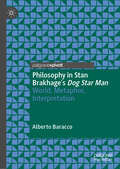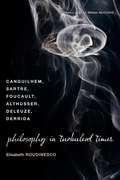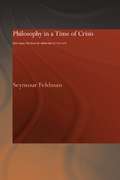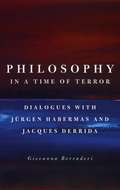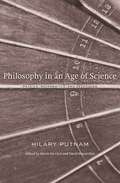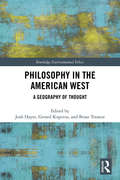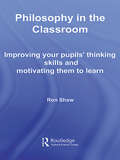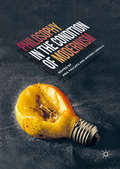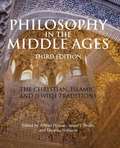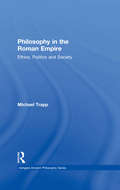- Table View
- List View
Philosophy for a Better World
by Floris Van Den BergAfter reading this book, the world won't look the same. Imagine yourself confined to a wheelchair; or living within the severely constricted lifestyle options of a woman in Saudi Arabia; or being a homosexual in a homophobic society; or a coffee farmer in Ethiopia; or a cow on a factory farm; or growing up impoverished in a developing country; or living 500 years from now when future generations may be negatively impacted by what we do today. This compelling thought experiment invites readers to take a moral journey, which in turn leads to an inconvenient evaluation of the way most of us live. The author proposes a new perspective, called universal subjectivism, which can be adopted by anyone regardless of religious or philosophical orientation. It takes into consideration the universal capacity for suffering and, through raising awareness, seeks to diminish that suffering and increase happiness. With consistent and crystal clear moral reasoning, van den Berg shows that the world can be organized to ensure more pleasure, beauty, justice, happiness, health, freedom, animal welfare, and sustainability. He emphasizes that today the near-term future is our greatest challenge: our affluent western lifestyle will soon exceed the limits of the earth's sustainable capacity and must soon change drastically to ward off a worldwide environmental collapse. Knowing this, we should all reevaluate the daily routines we take for granted: taking the car to work, boarding a plane to a business or vacation destination, eating meat, buying strawberries in winter, or using plastic bags in stores. There are ethical and ecological objections to each of these examples. In fact, if we applied a strict ethical analysis to our lifestyle, almost nothing we do would pass muster. Concluding with an eco-humanist manifesto, this offers much food for thought but, more importantly, an urgent and inspiring call to action.
Philosophy goes to the Movies: An Introduction To Philosophy
by Christopher FalzonPhilosophy goes to the Movies is a new kind of introduction to philosophy that makes use of movies including The Matrix, Antz, Total Recall and Cinema Paradiso, to explore philosophical ideas.Topics covered include:*the theory of knowledge*the self and personal Identity *moral philosophy*social and political philosophy*philosophy of science and technology*critical thinking. Ideal for the beginner, this book guides the student through philosophy using lively and illuminating cinematic examples. It will also appeal to anyone interested in the philosophical dimensions of cinema.
Philosophy in America
by Black, MaxFirst published in 2002. Routledge is an imprint of Taylor & Francis, an informa company.
Philosophy in Colonial India
by Sharad DeshpandeThis volume focuses on the gradual emergence of modern Indian philosophy through the cross-cultural encounter between indigenous Indian and Western traditions of philosophy, during the colonial period in India, specifically in the 19th and early 20th centuries. This volume acknowledges that what we take 'Indian philosophy' or 'modern Indian philosophy' to mean today is the sub-text of a much wider, complex and varied Indian reception of the West during the colonial period. Consisting of -twelve chapters and a thematic introduction, the volume addresses the role of academic philosophy in the cultural and social ferment of the colonial period in India and its impact on the development of cross-cultural philosophy, the emergence of a cosmopolitan consciousness in colonial India; as also the philosophical contribution of India to cultural globalization. The issue of colonialism and emergence of new identities in India has engaged the critical attention of scholars from diverse fields of inquiry such as history, sociology, politics, and subaltern studies. However, till today the emergence of modern Indian philosophy remains an unexplored area of inquiry. Much of the academic philosophical work of this period, despite its manifest philosophical originality and depth, stands largely ignored, not only abroad, but even in India. This neglect needs to be overcome by a re-reading of philosophical writings in English produced by scholars located in the universities of colonial India. This edited volume will facilitate further explorations into the presence of colonial tensions as they are visible in the writings of modern Indian academic philosophers like B. N. Seal, Hiralal Haldar, Rasvihary Das,, G. R. Malkani, K. C. Bhattacharyya, . G. N. Mathrani and others.
Philosophy in Cultural Theory
by Peter OsbornePhilosophy in Cultural Theory boldly crosses disciplinary boundaries to offer a philosophical critique of cultural theory today. Drawing on the legacy of Walter Benjamin, Peter Osborne looks critically at central philosophical debates in cultural theory, such as:* the relationship between sign and image* the technological basis of cultural form* the conceptuality of art* the place of fantasy in human affairs.It will appeal to those in philosophy, cultural studies and art theory.
Philosophy in Educational Research
by David BridgesThis book provides critical and reflective discussions of a wide range of issues arising in education at the interface between philosophy, research, policy and practice. It addresses epistemological questions about the intellectual resources that underpin educational research, explores the relationship between philosophy and educational research, and examines debates about truth and truthfulness in educational research. Furthermore, it looks at issues to do with the relationship between research, practice and policy, and discusses questions about ethics and educational research. Finally, the book delves into the deeply contested area of research quality assessment. The book is based on extensive engagement in empirically based educational research projects and in the institutional and professional management of research, as well as in philosophical work. It clarifies what is at stake in international debates around educational research and teases out the nature of the arguments, and, where argument permits, the conclusions to which these point. The book discusses these familiar themes using less predictable sources and points of reference, such as: codes of social obligation in contemporary Egypt and New Zealand; the 'Soviet', and the inspiration of the nineteenth-century philosopher, Abai in contemporary Kazakhstan; seventeenth-century France, Pascal, and the disputes between Jesuits and Jansenites; eighteenth-century Italy, Giambattista Vico, and la scienzia nuova; 'educational magic' in traditional Ethiopia; and ends at a banquet with Socrates and dinner with wine and a conversation-loving Montaigne.
Philosophy in Late Antiquity
by Andrew SmithPhilosophy in Late Antiquity provides an essential new introduction to the key ideas of the Neoplatonists, which affected approaches to Plato as late as the nineteenth century. Andrew Smith shows how they influenced Christian thought and his approach not only allows us to appreciate these philosophical ideas in their own right, but it also gives us significant insights into the mentality of the age which produced them.
Philosophy in Minutes
by Marcus WeeksPhilosophy in Minutes distills 200 of the most important philosophical ideas into easily digestible, bite-sized sections.The core information for every topic - including debates such as the role of philosophy in science and religion, key thinkers from Aristotle to Marx, and introductions to morality and ethics - is explained in straightforward language, using illustrations to make the concepts easy to understand and remember.Whether you are perplexed by existentialism or pondering the notion of free will, this accessible small-format book will help any reader to quickly grasp the basics of this highly nuanced subject.
Philosophy in Minutes
by Marcus WeeksPhilosophy in Minutes distils 200 of the most important philosophical ideas into easily digestible, bite-sized sections. The core information for every topic - including debates such as the role of philosophy in science and religion, key thinkers from Aristotle to Marx, and introductions to morality and ethics - is explained in straightforward language, using illustrations to make the concepts easy to understand and remember. Whether you are perplexed by existentialism or pondering the notion of free will, this accessible small-format book will help any reader to quickly grasp the basics of this highly nuanced subject. Chapters include: Truth and logic, Marxism, Communism and Socialism, Ontology, Philosophy and literature, Existence of God, Feminist theory, Consciousness, The future of philosophy.
Philosophy in Minutes (IN MINUTES)
by Marcus WeeksPhilosophy in Minutes distils 200 of the most important philosophical ideas into easily digestible, bite-sized sections. The core information for every topic - including debates such as the role of philosophy in science and religion, key thinkers from Aristotle to Marx, and introductions to morality and ethics - is explained in straightforward language, using illustrations to make the concepts easy to understand and remember. Whether you are perplexed by existentialism or pondering the notion of free will, this accessible small-format book will help any reader to quickly grasp the basics of this highly nuanced subject. Chapters include: Truth and logic, Marxism, Communism and Socialism, Ontology, Philosophy and literature, Existence of God, Feminist theory, Consciousness, The future of philosophy.
Philosophy in Reality: A New Book of Changes (Studies in Applied Philosophy, Epistemology and Rational Ethics #60)
by Abir U. Igamberdiev Joseph E. BrennerPhilosophy in Reality offers a new vision of the relation between science and philosophy in the framework of a non-propositional logic of real processes, grounded in the physics of the real world. This logical system is based on the work of the Franco-Romanian thinker Stéphane Lupasco (1900-1988), previously presented by Joseph Brenner in the book Logic in Reality (Springer, 2008). The present book was inspired in part by the ancient Chinese Book of Changes (I Ching) and its scientific-philosophical discussion of change. The emphasis in Philosophy in Reality is on the recovery of dialectics and semantics from reductionist applications and their incorporation into a new synthetic paradigm for knowledge. Through an original re-interpretation of both classical and modern Western thought, this book addresses philosophical issues in scientific fields as well as long-standing conceptual problems such as the origin, nature and role of meaning, the unity of knowledge and the origin of morality. In a rigorous transdisciplinary manner, it discusses foundational and current issues in the physical sciences - mathematics, information, communication and systems theory and their implications for philosophy. The same framework is applied to problems of the origins of society, the transformation of reality by human subjects, and the emergence of a global, sustainable information society. In summary, Philosophy in Reality provides a wealth of new perspectives and references, supporting research by both philosophers and physical and social scientists concerned with the many facets of reality.
Philosophy in Schools: An Introduction for Philosophers and Teachers (Routledge Studies in Contemporary Philosophy #47)
by Thomas E. Wartenberg Sara Goering Nicholas J. ShudakAll of us ponder the big and enduring human questions—Who am I? Am I free? What should I do? What is good? Is there justice? Is life meaningful?—but this kind of philosophical interrogation is rarely carefully explored or even taken seriously in most primary and secondary school settings. However, introducing philosophy to young people well before they get to college can help to develop and deepen critical and creative thinking, foster social and behavioral skills, and increase philosophical awareness. Philosophy in Schools: An Introduction Philosophers and Teachers is an invaluable resource for students and practitioners who wish to learn about the philosophy for children movement, and how to work its principles into their own classroom activities. The volume provides a wealth of practical information, including how to train educators to incorporate philosophy into their daily lessons, best practices and activity ideas for every grade level, and assessment strategies. With contributions from some of the best practitioners of philosophy for children, Philosophy in Schools is a must-have resource for students of philosophy and education alike.
Philosophy in Science
by Michael HellerThe traditional topics of the "philosophy of nature" -- space, time, causality, the structure of the universe -- are overwhelmingly present in our modern scientific theories. This book traces the complex paths that discussion of these topics has followed, from Plato and Aristotle, through Descartes, Leibniz, Kant and other great thinkers, right up to the relativistic cosmologies and the grand unified theories of contemporary science. In the light of this historical development, it becomes clear that modern science gives us not only a technological power over the world, but also a deeper understanding of physical reality. In this sense, science could be regarded as an heir to the traditional "philosophy of nature". Moreover, the reader will learn why science itself deserves to be the subject of philosophical reflection.
Philosophy in Seven Sentences: A Small Introduction to a Vast Topic (Introductions in Seven Sentences)
by Douglas GroothuisSocrates—The unexamined life is not worth living.Augustine—You have made us for yourself, and our hearts are restless until they rest in you.Descartes—I think, therefore I am.Pascal—The heart has reasons, that reason knows nothing of.
Philosophy in Stan Brakhage's Dog Star Man: World, Metaphor, Interpretation
by Alberto BaraccoThis book shows how a masterpiece of experimental cinema can be interpreted through hermeneutics of the film world. As an application of Ricœurian methodology to a non-narrative film, the book calls into question the fundamental concept of the film world. Firmly rooted within the context of experimental cinema, Stan Brakhage’s Dog Star Man was not created on the basis of a narrative structure and representation of characters, places and events, but on very different presuppositions. The techniques with which Brakhage worked on celluloid and used frames as canvases, as well as his choice to make the film without dialogue and sound, exhort the interpreter to directly question the philosophical language of moving images.
Philosophy in Turbulent Times: Canguilhem, Sartre, Foucault, Althusser, Deleuze, Derrida
by Elisabeth RoudinescoFor Elisabeth Roudinesco, a historian of psychoanalysis and one of France's leading intellectuals, Canguilhem, Sartre, Foucault, Althusser, Deleuze, and Derrida represent a "great generation" of French philosophers who accomplished remarkable work and lived incredible lives. These troubled and innovative thinkers endured World War II and the cultural and political revolution of the 1960s, and their cultural horizon was dominated by Marxism and psychoanalysis, though they were by no means strict adherents to the doctrines of Marx and Freud. Roudinesco knew many of these intellectuals personally, and she weaves an account of their thought through lived experience and reminiscences. Canguilhem, for example, was a distinguished philosopher of science who had a great influence on Foucault's exploration of sanity and madness-themes Althusser lived in a notorious personal drama. And in dramatizing the life of Freud for the screen, Sartre fundamentally altered his own philosophical approach to psychoanalysis. Roudinesco launches a passionate defense of Canguilhem, Sartre, Foucault, Althusser, Deleuze, and Derrida against the "new philosophers" of the late 1970s and 1980s, who denounced the work-and sometimes the private lives-of this great generation. Roudinesco refutes attempts to tar them, as well as the Marxist and left-wing tradition in general, with the brush of Soviet-style communism. In Freudian theory and the philosophy of radical commitment, she sees a bulwark against the kind of manipulative, pill-prescribing, and normalizing psychology that aims to turn individuals into mindless consumers. Intense, clever, and persuasive, Philosophy in Turbulent Times captivates with the dynamism of French thought in the twentieth century.
Philosophy in a Time of Crisis: Don Isaac Abravanel: Defender of the Faith (Routledge Jewish Studies Series)
by Seymour FeldmanThe expulsion from Spain did not only result in the destruction and dispersion of Spanish Jewry but led to a crisis in Jewish faith. Don Isaac Abravanel provided a systematic treatment of the main philosophical and theological beliefs of Judaism in an attempt to resolve the inner doubts of his co-religionists. In their Italian exile his son Judah too recognized that Jews were now living in a new cultural world, but he forged a different road for Jews to pursue in their entry into the culture of the Renaissance. This book presents a picture of one family facing the challenges of a new era in Jewish history.
Philosophy in a Time of Terror: Dialogues with Jurgen Habermas and Jacques Derrida
by Giovanna BorradoriThe idea for Philosophy in a Time of Terror was born hours after the attacks on 9/11 and was realized just weeks later when Giovanna Borradori sat down with Jürgen Habermas and Jacques Derrida in New York City, in separate interviews, to evaluate the significance of the most destructive terrorist act ever perpetrated. This book marks an unprecedented encounter between two of the most influential thinkers of our age as here, for the first time, Habermas and Derrida overcome their mutual antagonism and agree to appear side by side. As the two philosophers disassemble and reassemble what we think we know about terrorism, they break from the familiar social and political rhetoric increasingly polarized between good and evil. In this process, we watch two of the greatest intellects of the century at work.
Philosophy in a Time of Terror: Dialogues with Jürgen Habermas and Jacques Derrida
by Giovanna BorradoriThe idea for "Philosophy in a Time of Terror" was born hours after the attacks on 9/11 and was realized just weeks later when Giovanna Borradori sat down with Jurgen Habermas and Jacques Derrida in New York City, in separate interviews, to evaluate the significance of the most destructive terrorist act ever perpetrated. This book marks an unprecedented encounter between two of the most influential thinkers of our age as here, for the first time, Habermas and Derrida overcome their mutual antagonism and agree to appear side by side. As the two philosophers disassemble and reassemble what we think we know about terrorism, they break from the familiar social and political rhetoric increasingly polarized between good and evil. In this process, we watch two of the greatest intellects of the century at work. "
Philosophy in an Age of Science: Physics, Mathematics, and Skepticism
by Hilary PutnamHilary Putnam's unceasing self-criticism has led to the frequent changes of mind he is famous for, but his thinking is also marked by considerable continuity. A simultaneous interest in science and ethics unusual in the current climate of contention has long characterized his thought.
Philosophy in the American West: A Geography of Thought (Routledge Environmental Ethics)
by Josh Hayes Brian Treanor Gerard KuperusPhilosophy in the American West explores the physical, ecological, cultural, and narrative environments associated with the western United States, reflecting on the relationship between people and the places that sustain them. The American West has long been recognized as having significance. From Crèvecoeur’s early observations in Letters from an American Farmer (1782), to Thoreau’s reflections in Walden (1854), to twentieth-century thoughts on the legacy of a vanishing frontier, "the West" has played a pivotal role in the American narrative and in the American sense of self. But while the nature of "westernness" has been touched on by historians, sociologists, and, especially, novelists and poets, this collection represents the first attempt to think philosophically about the nature of "the West" and its influence on us. The contributors take up thinkers that have been associated with Continental Philosophy and pair them with writers, poets, and artists of "the West". And while this collection seeks to loosen the cords that tie philosophy to Europe, the traditions of "continental" philosophy—phenomenology, hermeneutics, deconstruction, and others—offer deep resources for thinking through the particularity of place. This book will be of great interest to students and scholars of Philosophy, as well as those working in Ecocriticism and the Environmental Humanities more broadly.
Philosophy in the Classroom: Improving your Pupils' Thinking Skills and Motivating Them to Learn
by Ron ShawEver had difficulty inspiring your children to consider and discuss philosophical concepts? Philosophy in the Classroom helps teachers tap in to children’s natural wonder and curiosity. The practical lesson plans, built around Aesop’s fables, encourage children to formulate and express their own points of view, enabling you to lead rich and rewarding philosophical discussions in the primary classroom. This highly practical and engaging classroom companion: prompts students to consider serious moral issues in an imaginative and stimulating way uses Aesop's fables as a springboard to pose challenging questions about the issues raised provides fifteen key themes including happiness, wisdom, self-reliance and judging others as the basis for classroom discussion. uses powerful and creative drawings to illustrate activities and photocopiable resources. Philosophy in the Classroom is an invaluable resource for any primary school teacher wanting to engage their students in meaningful philosophical reflection and discussion. Ron Shaw has many years of classroom experience and is the author of more than forty books helping primary and secondary school students to improve their thinking skills.
Philosophy in the Condition of Modernism
by Ana Falcato Antonio CardielloProduced on the fringes of philosophy and literary criticism, this book is a pioneering study which aims to explicitly address and thematize what may be called a “critical philosophy in the condition of modernism”. Its most important and original contribution to both disciplines is a self-conscious reflection on possible modes of writing philosophy today, and a systematic comparison with what happened in literary modernism at the beginning of the twentieth-century. The volume is divided into six sections, where internationally renowned scholars discuss such pressing topics as the role of an unreliable narrator in a major philosophical treatise, the different mediums of art-production and how these impact on our perception of the Work itself, the role of narrative in animal ethics and the filmic adaption of a Modernist classic.
Philosophy in the Middle Ages: The Christian, Islamic, and Jewish Traditions
by Thomas Williams James J. Walsh Arthur HymanThomas Williams' revision of Arthur Hyman and James J. Walsh's classic compendium of writings in the Christian, Islamic, and Jewish medieval philosophical traditions expands the breadth of coverage that helped make its predecessor the best known and most widely used collection of its kind.The third edition builds on the strengths of the second by preserving its essential shape while adding several important new texts--including works by Augustine, Boethius, Pseudo-Dionysius the Areopagite, Anselm, al-Farabi, al-Ghazali, Ibn Rushd, Bonaventure, Thomas Aquinas, and John Duns Scotus--and featuring new translations of many others.The volume has also been redesigned and its bibliographies updated with the needs of a new generation of students in mind.
Philosophy in the Roman Empire: Ethics, Politics and Society (Ashgate Ancient Philosophy Series)
by Michael TrappDrawing on unusually broad range of sources for this study of Imperial period philosophical thought, Michael Trapp examines the central issues of personal morality, political theory, and social organization: philosophy as the pursuit of self-improvement and happiness; the conceptualization and management of emotion; attitudes and obligations to others; ideas of the self and personhood; constitutional theory and the ruler; the constituents and working of the good community. Texts and thinkers discussed range from Alexander of Aphrodisias, Aspasius and Alcinous, via Hierocles, Seneca, Musonius, Epictetus, Plutarch and Diogenes of Oenoanda, to Dio Chrysostom, Apuleius, Lucian, Maximus of Tyre, Pythagorean pseudepigrapha, and the Tablet of Cebes. The distinctive doctrines of the individual philosophical schools are outlined, but also the range of choice that collectively they presented to the potential philosophical 'convert', and the contexts in which that choice was encountered. Finally Trapp turns his attention to the status of philosophy itself as an element of the elite culture of the period, and to the ways in which philosophical values may have posed a threat to other prevalent schemes of value; Trapp argues that the idea of 'philosophical opposition', though useful, needs to be substantially modified and extended.
